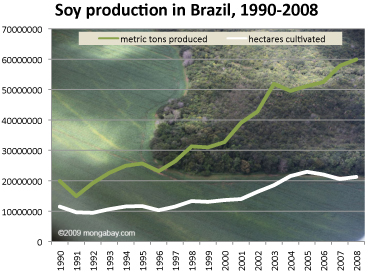Brazilian soy farmers have extended their moratorium on Amazon deforestation for another year, reports Greenpeace.
The moratorium was established in July 2006 in response to concerns among big soy buyers — notably McDonalds and Carrefour — that soy expansion was driving large-scale destruction of Earth’s largest rainforest. Soy producers in the region have since registered their holdings in order to sell their product to major crushers and traders. Registered properties are monitored via satellite, airplane flyovers, and on-the-ground visits for compliance.
Greenpeace says that improved forest monitoring this year led to 75 farms being caught and expelled from the system, up from 12 last year. The farms can no longer sell to major soy traders.
 |
“The moratorium remains a positive step in helping us control and monitor the soya used in our supply chain,” said Denis Hennequin, McDonald’s Europe President. “We will continue to participate and support this initiative to help protect the Amazon.”
Greenpeace says the latest satellite data shows that Amazon deforestation has decreased while soy yields have increased since the moratorium went into effect.
“The Amazon soya moratorium demonstrates that production and conservation can go hand in hand,” said Paulo Adario, Greenpeace Amazon Campaign Director, in a statement. “But there is still much work to be done before Brazilian agricultural production is completely free from deforestation.”
Greenpeace and other NGOs are also working with the cattle sector to reduce the impact of cattle ranching — the biggest driver of Amazon deforestation — and cane production. The soy moratorium is being used as a model for these efforts.
“Brazilian soya and cattle traders are supporting efforts to stop deforestation because the global market rejects products linked to the destruction of the Amazon,” said Adario. “But they cannot guarantee their products are deforestation free until the government, farmers and traders work together to ensure that all farms in the Amazon are publicly registered so that the culprits can be caught and held accountable.”
Brazil is the world’s largest exporter of soy.
Related articles